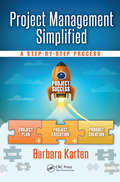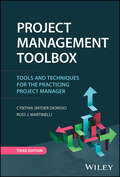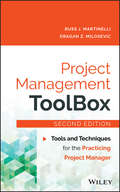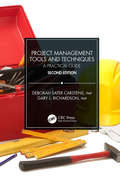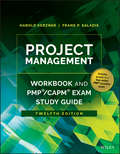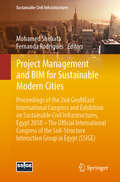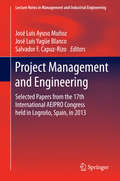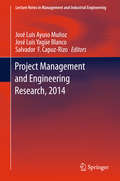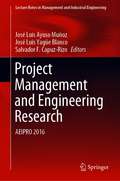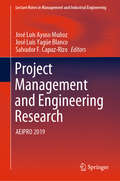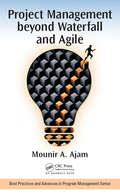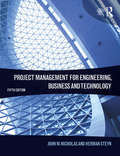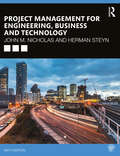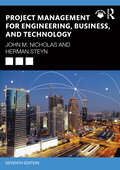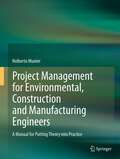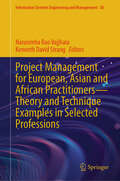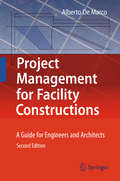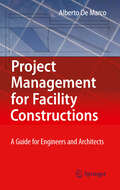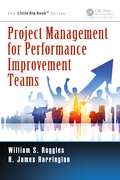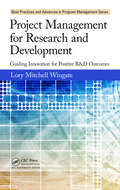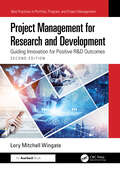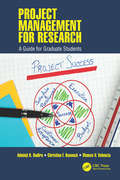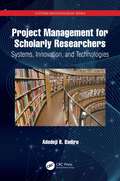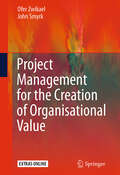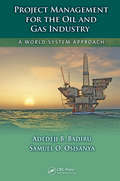- Table View
- List View
Project Management Simplified: A Step-by-Step Process (Systems Innovation Book Ser.)
by Barbara KartenAre projects a problem for you? Do your projects cost too much, take too long, or are just not quite right? If so, Project Management Simplified: A Step-by-Step Process is the book for you. It applies well-defined processes for managing projects to managing change in our lives. It describes an approach modeled on a process used successfully in busi
Project Management ToolBox: Tools and Techniques for the Practicing Project Manager
by Russ J. Martinelli Cynthia Snyder DionisioComprehensive, on-the-go toolkit for professional project managers, updated to reflect the tools necessary for today’s predictive, adaptive, hybrid work environment Project Management ToolBox is a go-to reference for on-the-job project managers and advanced students of project management, providing a contemporary set of tools and explaining each tool’s purpose and intention, development, customization and variations. Examples, tips, and variations guide readers through the application of these tools. The Third Edition, led by bestselling project management author Cynthia Snyder Dionisio, has been updated to offer a contemporary set of tools to reflect changes in project management learning and practice. This edition includes several new chapters that reflect today’s predictive, adaptive, and hybrid work environment. New content includes the project canvas, project roadmap, procurement strategy, risk responses, and more. The book is structured to follow the flow of projects, starting with project selection, project origination, planning, implementation, monitoring, and closure. Within each section there is a wealth of tools, examples, tips, and variations to tailor the use of the tools. Sample topics covered in Project Management ToolBox include: Economic methods, such as payback time, net present value, and internal rate of return. Identifying, analyzing, and communicating with project stakeholders. Plans for eliciting, managing, and specifying requirements, along with a matrix to tracing requirements. Work breakdown structures, network diagrams, critical path method, and critical chain method. Exploring emerging topics within the world of project management and keeping up to date on the latest, most relevant subject areas, Project Management ToolBox is a must-have resource that enables project managers to improve outcomes, deliver quality products and meet stakeholder expectations.
Project Management ToolBox: Tools and Techniques for the Practicing Project Manager
by Dragan Z. Milosevic Russ J. MartinelliBoost your performance with improved project management tactics Project Management ToolBox: Tools and Techniques for the Practicing Project Manager, Second Edition offers a succinct explanation of when, where, and how to use project management resources to enhance your work. With updated content that reflects key advances in the project management field, including planning, implementation, control, cost, and scheduling, this revised text offers added material that covers relevant topics, such as agility, change management, governance, reporting, and risk management. This comprehensive resource provides a contemporary set of tools, explaining each tool's purpose and intention, development, customization and variations, and benefits and disadvantages. Additionally, examples, tips, and milestone checks guide you through the application of these tools, helping you practically apply the information you learn. Effective project management can support a company in increasing market share, improving the quality of products, and enhancing customer service. With so many aspects of project management changing as the business world continues to evolve, it is critical that you stay up to date on the latest topics in this field. Explore emerging topics within the world of project management, keeping up to date on the latest, most relevant subject areas Leverage templates, exercises, and PowerPoint presentations to enhance your project management skills Discuss tips, reporting, implementation, documentation, and other essentials of the project management field Consider how project management fits into various industries, including technology, construction, healthcare, and product development Project Management ToolBox: Tools and Techniques for the Practicing Project Manager, Second Edition is an essential resource for experienced project managers and project management students alike.
Project Management Tools and Techniques: A Practical Guide, Second Edition
by Gary L. Richardson Deborah Sater CarstensThe topic of project management is truly an evolution of art seeking science. This activity involves balancing project objectives against the constraints of time, budget, and quality. Achieving this balance requires skill, experience, along with the use of many tools, and techniques which are the focus of this book. This new edition provides updated content to incorporate examples from Microsoft Project 2016 and material from the Project Management Body of Knowledge (PMBOK® Guide), sixth edition. The chapter structure includes step-by-step instructions regarding the basic mechanics and various software tools that can be used to assist in the processes. To reinforce the textbook’s learning objectives, extra material is provided on the textbook website. This includes mechanical tool examples and lab assignments representative of the chapter topics. An external video tutorial library is available to help with various mechanics related to Microsoft Project mechanics. An instructor manual is available for qualifying adoptions for classroom use. Features Illustrates the use of Microsoft Project throughout the project life cycle Offers templates as productivity enhancement tools Includes supplemental material for students and instructors Provides assignments for hands-on experience Follows the PMI PMBOK ® Guide model structure that will support a better understanding of the model and help prepare students for PMP and CAPM certification Illustrates both traditional and contemporary management techniques
Project Management Workbook and PMP / CAPM Exam Study Guide
by Harold Kerzner Frank P. SaladisSharpen your project management skills and prepare for the latest PMP®/CAPM® exam The Project Management Workbook and PMP/CAPM Exam Study Guide is a two-in-one resource for mastering the Project Management Body of Knowledge (PMBOK®). As the companion to Project Management: A Systems Approach to Planning, Scheduling, and Controlling, this book provides the opportunity to strengthen your understanding of project management in real-world application, with questions, problems, and cases designed to enhance your critical thinking skills. Functioning as a stand-alone study guide to the Project Management Professional (PMP) Certification Exam, this book helps you develop the critical skills of a successful project manager with questions that show you what to expect on exam day. Interesting, enjoyable, and thought-provoking, this workbook and study guide helps you dig into the PMBOK and gain the professional insights that come only from applying what you've learned. Reading the PMBOK doesn't fully prepare you to pass the PMP exam, let alone function as a project manager in the real world. Understanding how to apply the various methodologies is vital to your success, and this book gives you a wealth of guided practice to hone your skills in advance. Practice applying project management concepts Test your grasp of the PMBOK methodology Preview the PMP with simulated exam questions Enhance your critical thinking and project management skills The project manager's role is broad in scope and detailed in function. Don't try to memorize the PMBOK, internalize it; this approach gives you a ready body of knowledge available for recall as needed, and helps you become a more efficient, more effective project manager. Instinctive knowledge comes from copious practice, and the Project Management Workbook and PMP/CAPM Exam Study Guide is your ideal resource for developing your skills. (PMI, PMBOK, CAPM, PMP, and Project Management Professional are registered marks of the Project Management Institute, Inc.)
Project Management and BIM for Sustainable Modern Cities: Proceedings of the 2nd GeoMEast International Congress and Exhibition on Sustainable Civil Infrastructures, Egypt 2018 – The Official International Congress of the Soil-Structure Interaction Group in Egypt (SSIGE) (Sustainable Civil Infrastructures)
by Fernanda Rodrigues Mohamed ShehataThis volume presents innovative work on innovative methods, tools and practices aimed at supporting the transition of Asian and Middle Eastern cities and regions towards a more smart and sustainable dimension. The role of the built and urban environment are becoming more pronounced in Asia and Middle East as the regions continues to experience rapid increase in population and urbanisation, which have only led to an increase in environmental degradation but also rise in energy consumption and emissions. Individual chapters covers timely topics such as sustainable infrastructure, transportation, renewable energy, water and methods supporting an innovative and sustainable development of urban areas. Real-world examples are presented to highlight recent developments and advancements in design, construction and transportation infrastructures. The volume is based on the best contributions to the 2nd GeoMEast International Congress and Exhibition on Sustainable Civil Infrastructures, Egypt 2018 – The official international congress of the Soil-Structure Interaction Group in Egypt (SSIGE).
Project Management and Engineering
by José Luis Ayuso Muñoz José Luis Yagüe Blanco Salvador F. Capuz-RizoProject Management and Engineering is an emergent area. Projects have a tendency to grow in size, involve more stakeholders, and be of greater environmental, organizational and technological complexity. They must also fulfil continuously increasing requirements. This causes greater demands on the effectiveness of Project Engineering and the efficiency of Project Management. This volume brings together a collection of recent work by researchers and professionals in the fields of project management and design in civil engineering, environmental engineering, energy efficiency, rural development, production and process engineering, industrial design and information technology and communication.
Project Management and Engineering Research, 2014
by José Luis Ayuso Muñoz José Luis Yagüe Blanco Salvador F. Capuz-RizoThis volume features papers from the 18th International Congress on Project Management and Engineering, held by the University of Zaragoza in collaboration with the Spanish Association of Project Management and Engineering (AEIPRO). It illustrates the state of the art in this emerging area. Readers will discover ways to increase the effectiveness of project engineering as well as the efficiency of project management. The papers, written by international researchers and professionals, cover civil engineering and urban planning, product and process engineering, environmental engineering, energy efficiency and renewable energies, rural development, safety, labor risks and ergonomics, and training in project engineering. Overall, this book contributes to the improvement of project engineering research and enhances the transfer of results to the job of project engineers and project managers around the world. It will appeal to all professionals in the field as well as researchers and teachers involved in the training of future professionals.
Project Management and Engineering Research: AEIPRO 2016 (Lecture Notes in Management and Industrial Engineering #0)
by José Luis Ayuso Muñoz José Luis Yagüe Blanco Salvador F. Capuz-RizoThis book gathers the best papers presented at the 19th International Congress on Project Management and Engineering, which was held in Granada, Spain in July 2015. It covers a range of project management and engineering contexts, including: civil engineering and urban planning, product and process engineering, environmental engineering, energy efficiency and renewable energies, rural development, information and communication technologies, safety, labour risks and ergonomics, and training in project engineering.Project management and engineering is taking on increasing importance as projects continue to grow in size, more stakeholders become involved, and environmental, organisational and technological issues become more complex. As such, this book offers a valuable resource for all professionals seeking the latest material on the changing face of project management.
Project Management and Engineering Research: AEIPRO 2019 (Lecture Notes in Management and Industrial Engineering #0)
by José Luis Ayuso Muñoz José Luis Yagüe Blanco Salvador F. Capuz-RizoThis book gathers the best papers presented at the International Congress on Project Management and Engineering, in its 2017 and 2018 editions, which were held in Cádiz and Madrid, Spain. It covers a range of topic areas, including civil engineering and urban planning, product and process engineering, environmental engineering, energy efficiency and renewable energies, rural development, information and communication technologies, and risk management and safety.
Project Management beyond Waterfall and Agile (Best Practices in Portfolio, Program, and Project Management)
by Mounir AjamThis book goes beyond the paint by numbers approach, transcending the "how" of project management to the "what" and "why," which is critical for leaders of change. — Dr. Joel B. Carboni, President and Founder, GPM Global and President, IPMA-USA <P><P> Project Management beyond Waterfall and Agile presents a flexible, universal, and integrated three-dimensional model for managing projects, the Customizable and Adaptable Methodology for Managing Projects™ (CAMMP™ ). By tailoring and customizing the model to a specific industry or organization and by adapting it to a function or project classification, this model can be used to manage any project. CAMMP™ can also be used both in a traditional or an Agile environment. CAMMP™ integrates leading concepts on competence, processes, and sustainability. The model’s three dimensions are project lifecycle, project management processes, and, finally, competence, sustainability, and best practices. The book explains how to integrate these dimensions to manage a project across the three dimensions and the project stages. CAMMP™ is a stage-gate process, which is vital for project success. <P><P>The current state of practice in project management is not sustainable. The root causes of this problem include a lack of standardized processes, missing methods or methodological approaches, and no real organizational system for managing projects. <P><P>This book introduces a system to address these shortcomings. It focuses on the elements of this system, which is a practical and systematic methodological approach for managing and delivering all types of projects. <P><P>CAMMP™ integrates the best learning from the various global associations in the field. The book distills the experience and knowledge of a practitioner working in different roles for more than three decades on various types of projects of all sizes and complexities. It is a practical book by a practitioner writing for practitioners.
Project Management for Engineering, Business and Technology
by Herman Steyn John M. NicholasProject Management for Engineering, Business and Technology, 5th edition, addresses project management across all industries. First covering the essential background, from origins and philosophy to methodology, the bulk of the book is dedicated to concepts and techniques for practical application. Coverage includes project initiation and proposals, scope and task definition, scheduling, budgeting, risk analysis, control, project selection and portfolio management, program management, project organization, and all-important "people" aspects—project leadership, team building, conflict resolution and stress management. The Systems Development Cycle is used as a framework to discuss project management in a variety of situations, making this the go-to book for managing virtually any kind of project, program or task force. The authors focus on the ultimate purpose of project management—to unify and integrate the interests, resources and work efforts of many stakeholders, as well as the planning, scheduling, and budgeting needed to accomplish overall project goals. This new edition features: Updates throughout to cover the latest developments in project management methodologies New examples and 18 new case studies throughout to help students develop their understanding and put principles into practice A new chapter on agile project management and lean Expanded coverage of program management, stakeholder engagement, buffer management, and managing virtual teams and cultural differences in international projects Alignment with PMBOK terms and definitions for ease of use alongside PMI certifications Cross-reference to IPMA, APM, and PRINCE2 methodologies Extensive instructor support materials, including an Instructor’s Manual, PowerPoint slides, answers to chapter review questions, problems and cases, and a test bank of questions. Taking a technical yet accessible approach, Project Management for Business, Engineering and Technology, 5th edition, is an ideal resource and reference for all advanced undergraduate and graduate students in project management courses as well as for practicing project managers across all industry sectors.
Project Management for Engineering, Business and Technology
by Herman Steyn John M. NicholasProject Management for Engineering, Business and Technology is a highly regarded textbook that addresses project management across all industries. First covering the essential background, from origins and philosophy to methodology, the bulk of the book is dedicated to concepts and techniques for practical application. Coverage includes project initiation and proposals, scope and task definition, scheduling, budgeting, risk analysis, control, project selection and portfolio management, program management, project organization, and all-important "people" aspects—project leadership, team building, conflict resolution, and stress management. The systems development cycle is used as a framework to discuss project management in a variety of situations, making this the go-to book for managing virtually any kind of project, program, or task force. The authors focus on the ultimate purpose of project management—to unify and integrate the interests, resources and work efforts of many stakeholders, as well as the planning, scheduling, and budgeting needed to accomplish overall project goals. This sixth edition features: updates throughout to cover the latest developments in project management methodologies; a new chapter on project procurement management and contracts; an expansion of case study coverage throughout, including those on the topic of sustainability and climate change, as well as cases and examples from across the globe, including India, Africa, Asia, and Australia; and extensive instructor support materials, including an instructor’s manual, PowerPoint slides, answers to chapter review questions and a test bank of questions. Taking a technical yet accessible approach, this book is an ideal resource and reference for all advanced undergraduate and graduate students in project management courses, as well as for practicing project managers across all industry sectors.
Project Management for Engineering, Business, and Technology
by Herman Steyn John M. NicholasProject Management for Engineering, Business, and Technology is a highly regarded textbook that addresses project management across all industries. First covering the essential background, from origins and philosophy to methodology, the bulk of the book is dedicated to concepts and techniques for practical application.The systems development cycle is used as a framework to discuss project management in a variety of situations, making this the go-to book for managing virtually any kind of project, program, or task force. It focuses on the ultimate purpose of project management—to unify and integrate the interests, resources, and work efforts of many stakeholders, as well as the planning, scheduling, and budgeting needed to accomplish overall project goals.The seventh edition features:• Updates to cover the latest developments in project management methodologies, including new material on applications of visual management, agile and hybrid methodologies, PM 2.0, and artificial intelligence to project management, and on the “dark side” of projects, projects in developing countries, and megaprojects.•Sixty-two end-of-chapter case studies that apply concepts and practices from the book to real-life project situations.• Updated support materials, including an instructor’s manual, PowerPoints, answers to chapter review questions, and a test bank of questions.Taking a technical yet accessible approach, this book is an ideal resource and reference for all advanced undergraduate and graduate students in project management courses, as well as for practicing project managers across all industry sectors.
Project Management for Environmental, Construction and Manufacturing Engineers: A Manual for Putting Theory into Practice
by Nolberto MunierAs a companion to books on project-management theory, this book illustrates, in a down-to-earth, comprehensive style, how to put that theory into practice. In addition to the many examples that illustrate procedures, the book includes over 25 case studies, each one addressing a specific theme. Key topics, such as project selection, negotiations, planning and scheduling, cost and budgeting, project control, human resources, environmental impacts, risk management, and financial evaluation, are discussed, using a step-by-step approach. Beginning at the grassroots level, some cases are solved by hand to illustrate the mechanics of a procedure, while others are solved using advanced computer programs. In this way the reader has a clear idea of the problem, how and when to raise the issue, information needed (and who can provide it), how to solve it by hand, when possible, and also its resolution using the latest informatics tools.
Project Management for European, Asian and African Practitioners—Theory and Technique Examples in Selected Professions (Information Systems Engineering and Management #30)
by Narasimha Rao Vajjhala Kenneth David StrangThis book bridges the gap between theory and practice, offering a rich exploration of project management practices across Europe, Asia, and Africa. This book presents a collection of cutting-edge research and case studies that illustrate the application of project management principles in various industries and regions. Through contributions from global scholars and practitioners, this book covers a wide range of topics, from the rise of hybrid project management methodologies to the challenges of managing public projects, to the role of artificial intelligence in multicultural leadership. Key themes include decision-making, critical thinking, resilience in collaborative R&D, and project management in emerging markets such as Africa and Asia’s tiger economies. This book is designed for project managers, researchers, and professionals who want to understand the unique challenges and opportunities of managing projects in diverse cultural and economic contexts. By examining case studies and research from around the globe, readers will gain valuable insights into how to apply project management techniques in real-world scenarios.
Project Management for Facility Constructions: A Guide For Engineers And Architects
by Alberto De MarcoThis book describes principles, quantitative methods and techniques for financing, planning, and managing projects to develop a variety of constructed facilities in the fields of oil & gas, power, infrastructure, architecture and the commercial building industries.It is addressed to a broad range of professionals willing to improve their project management skills and designed to help newcomers to the engineering and construction industry understand how to apply project management to field practice. Also, it makes project management disciplines accessible to experts in technical areas of engineering and construction. In education, this text is suitable for undergraduate and graduate classes in architecture, engineering and construction management, as well as for specialist and professional courses in project management.
Project Management for Facility Constructions: A Guide for Engineers and Architects
by Alberto De MarcoThis book describes concepts, methods and practical techniques for managing projects to develop constructed facilities in the fields of oil & gas, power, infrastructure, architecture and the commercial building industries. It is addressed to a broad range of professionals willing to improve their management skills and designed to help newcomers to the engineering and construction industry understand how to apply project management to field practice. Also, it makes project management disciplines accessible to experts in technical areas of engineering and construction. In education, this text is suitable for undergraduate and graduate classes in architecture, engineering and construction management, as well as for specialist and professional courses in project management.
Project Management for Performance Improvement Teams (The Little Big Book Series)
by H. James Harrington William S. RugglesProject Management for Performance Improvement Teams (or, PM4PITs, for short) provides practical guidance based on innovative concepts for project teams -- especially Performance Improvement Teams (PITs)—and their Project Managers on how to successfully complete individual projects and programs using an ingenious and scalable framework based on an innovative foundation fusing together elements of Project Management, Innovation Management, and Continual Improvement. This book lays out how Project and Program Managers and their teams can "do those right projects the right way," one project at a time. It details what continual improvement, change, and innovation are, why they are so important, and how they apply to performance improvement—both incremental and transformative. The authors examine the four types of work and workforce management in organizations, Strategic, Operations, Projects, and Crises, using four common comparative variables: Proactive/Preventive versus Reactive/Corrective, Temporary/Unique versus Ongoing/Repetitive, Innovative versus Maintaining the Status Quo, and Schedule Focus: Fiscal Year versus Short Term versus Long Term. These comparisons set the stage for the uniqueness of the third type: Projects (and Programs) that are fundamentally change-driven.
Project Management for Research and Development: Guiding Innovation for Positive R&D Outcomes (Best Practices in Portfolio, Program, and Project Management #10)
by Lory Mitchell WingateToday's leading organizations recognize the importance of research and development (R&D) to maintain and grow market share. If companies want to survive into the future, they must accelerate their R&D-to-market cycles or find themselves behind the competition.Project Management for Research and Development: Guiding Innovation for Positive R
Project Management for Research and Development: Guiding Innovation for Positive R&D Outcomes (Best Practices in Portfolio, Program, and Project Management)
by Lory Mitchell WingateResearch and development (R&D) activities do not fit the traditional project model. They may seem difficult to manage because of their inherent ambiguity, the need for creative exploration, and often the lack of having defined milestones and outcomes. However, project management methods, along with systems engineering as a complementary discipline, provide the ability to categorize R&D activities, bound them, and then assess progress along a defined course of action. They also provide information about status and progress, visibility into opportunities and challenges that might otherwise be missed, allowing timely course corrections.Project Management for Research and Development: Guiding Innovation for Positive R&D Outcomes, Second Edition, provides methods for optimizing results in R&D by using structured processes that come from project management and are intertwined with the key complementary discipline of systems engineering. It provides processes, tools, and techniques to assess and manage creative activities in an optimal way. The core of the book is a flexible framework, which lifts the burden off organizations that do not want to invest heavily in implementing a significant number of often conflicting processes. It is a lightweight, flexible structure to help organizations and individuals meet their most important goals, no matter how complicated or complex these goals may be.Each chapter in the book includes Apply Now exercises, which allow immediate application of fundamental concepts, summarizes key points of concepts and terms, and provides templates to apply the ideas from each chapter to a real-life situation. The book also features unique and creative case studies to demonstrate the application of project management to various R&D projects.
Project Management for Research: A Guide for Graduate Students (Systems Innovation Book Series)
by Adedeji B. Badiru Vhance V. Valencia Christina F. RusnockGraduate research is a complicated process, which many undergraduate students aspire to undertake. The complexity of the process can lead to failures for even the most brilliant students. Success at the graduate research level requires not only a high level of intellectual ability but also a high level of project management skills. Unfortunately, many graduate students have trouble planning and implementing their research. Project Management for Research: A Guide for Graduate Students reflects the needs of today’s graduate students. All graduate students need mentoring and management guidance that has little to do with their actual classroom performance. Graduate students do a better job with their research programs if a self-paced guide is available to them. This book provides such a guide. It covers topics ranging from how to select an appropriate research problem to how to schedule and execute research tasks. The authors take a project management approach to planning and implementing graduate research in any discipline. They use a conversational tone to address the individual graduate student. This book helps graduate students and advisors answer most of the basic questions of conducting and presenting graduate research, thereby alleviating frustration on the part of both student and advisor. It presents specific guidelines and examples throughout the text along with more detailed examples in reader-friendly appendices at the end. By being more organized and prepared to handle basic research management functions, graduate students, along with their advisors, will have more time for actual intellectual mentoring and knowledge transfer, resulting in a more rewarding research experience.
Project Management for Scholarly Researchers: Systems, Innovation, and Technologies (Systems Innovation Book Series)
by Adedeji B. BadiruThis book presents practical guidelines for university research and administration. It uses a project management framework within a systems perspective to provide strategies for planning, scheduling, allocating resources, tracking, reporting, and controlling university-based research projects and programs. Project Management for Scholarly Researchers: Systems, Innovation, and Technologies covers the technical and human aspects of research management. It discusses federal requirements and compliance issues, in addition to offering advice on proper research lab management and faculty mentoring. It explains the hierarchy of needs of researchers to help readers identify their own needs for their research enterprises. This book provides rigorous treatment and guidance for all engineering fields and related business disciplines, as well as all management and humanities fields.
Project Management for the Creation of Organisational Value
by John Smyrk Ofer ZwikaelProjects and programmes are approved and funded to generate benefits. Project Management for the Creation of Organisational Value proposes a complete framework that seeks to support such an objective - from project selection and definition, through execution, and beyond implementation of deliverables until benefits are secured. Because it is preoccupied with deliverables, accepted project management practice is flawed. Project Management for the Creation of Organisational Value proposes an alternative approach, which seeks a flow of target outcomes for the organisation investing in the project. Project Management for the Creation of Organisational Value provides support for all those who play a role of leadership in projects at different levels. Senior executives, practitioners and academics will find in this book a comprehensive guide to the conduct of projects and programmes, which includes robust models, a set of consistent principles, an integrated glossary, enabling tools, illustrative examples and case studies.
Project Management for the Oil and Gas Industry: A World System Approach (Systems Innovation Book Series)
by Adedeji B. Badiru Samuel O. OsisanyaThis book presents an integrated approach to project management for oil and gas projects. It covers concepts, tools, and techniques of project management based on the elements of the Project Management Body of Knowledge. The book also contains case examples of applications of project management tools and techniques to real-life project scenarios. The book is intended to serve as a reference book for planners, project operators, stakeholders, designers, project managers, business managers, consultants, project analysts, senior executives, project team members, members of project management office, project customers, functional managers, trainers, and researchers.
